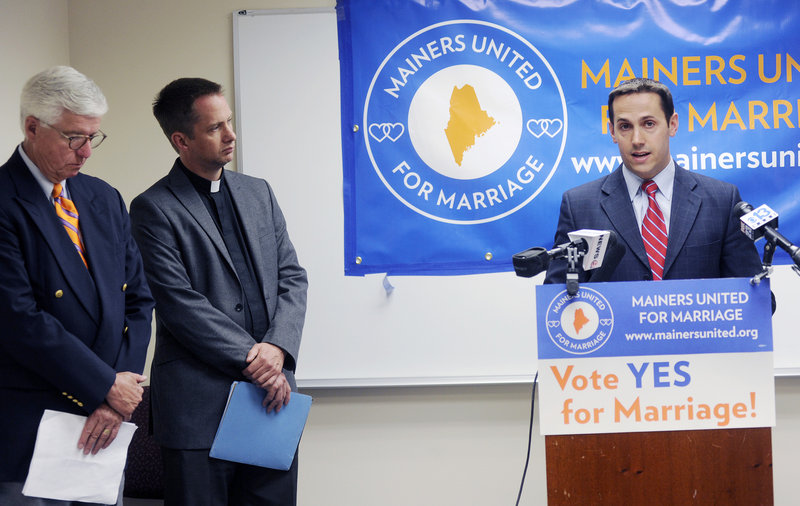PORTLAND – Supporters of a proposal to allow same-sex marriage in Maine said Wednesday that they will ask Maine Secretary of State Charlie Summers to change the wording of the ballot question so it refers to the protection of religious freedom.
Summers proposed this question last week for the Nov. 6 ballot: “Do you want to allow same-sex couples to marry?”
Matt McTighe, campaign manager for Mainers United for Marriage, said, “Simply put, the question as drafted is inaccurate. … It fails to address important parts of the initiative that more than 105,000 Mainers signed” to get the proposal on the ballot.
The ballot proposal would do two things, McTighe said. It would allow same-sex couples to get marriage licenses, and it would exempt religious institutions from having to perform marriages that violate their beliefs.
While that protection is in the U.S. Constitution, he said, he fears that opponents will confuse voters by claiming that they will lose religious freedom if gays and lesbians are allowed to marry.
The proposed law says, in part: “The refusal to perform or host a marriage under this subsection cannot be the basis for a lawsuit or liability and does not affect the tax-exempt status of the church, religious denomination or other religious institution.”
Summers’ release of the proposed ballot question started a 30-day public comment period, which ends July 16. He said Wednesday that his office has received more than 150 comments from the public. He did not want to say whether they were mostly for or against his proposed wording.
“Once all the comments are in, I’ll look at them and make a decision,” he said. “The great thing is, people are paying attention. The responsibility I have is to make sure it’s a clear and concise question.”
While Summers opposes gay marriage, and was chosen for his position by Republicans in the Legislature, McTighe said he doesn’t think the question was worded with political implications in mind.
“In fact, I think they were probably trying to make the question clear,” he said. “In doing that, they left out a key provision.”
John Patterson, a former deputy attorney general who’s now president of the board of directors of the American Civil Liberties Union of Maine, said state law requires the secretary of state to word ballot questions “simply, clearly, concisely and directly.”
“The problem is, the draft question prepared by the secretary of state is only concise,” he said. “It is not direct. In fact, it is misleading and incomplete.”
When the activists submitted their signatures to Summers last year, they submitted a question that they want on the Nov. 6 ballot: “Do you favor a law allowing marriage licenses for same-sex couples that protects religious freedom by ensuring no religion or clergy be required to perform such a marriage in violation of their religious beliefs?”
Carroll Conley, executive director of the Christian Civic League of Maine, said the concept of religious freedom is complicated, and cannot be distilled accurately into a clause in a ballot question.
“It’s redundant and potentially misleading (to include it),” said Conley, whose organization is campaigning against same-sex marriage. “There are other religious liberty issues we believe are jeopardized. Let’s flesh those out in the campaign. Let’s have our debates and op-eds.”
Conley sent an email Monday asking opponents of gay marriage to contact Summers to thank him for excluding the religious-liberty language and ask him to consider changing the question to say it would “change Maine law” or “redefine marriage.”
In an interview Wednesday, Conley said the group is mostly happy with the question proposed by Summers.
“They are avoiding ambiguity, and that is helpful when someone is standing there ready to vote,” he said.
Conley and others have argued since last week that it’s unnecessary to include the religious-freedom exemption in the ballot question because it’s in the Constitution.
Supporters of gay marriage acknowledge the constitutional protection, but say it’s important to make it clear to voters.
“As it stands right now, I have no obligation to marry anybody as a pastor,” said Pastor Michael Gray of the Old Orchard Beach United Methodist Church. “Nothing changes when this law is enacted in November.”
Gray was the lead petitioner who submitted the ballot initiative to Summers last year.
If Summers does not change the question, his decision can be appealed in court. McTighe said he did not want to speculate on what his group will do if there is no change.
Kennebec Journal Staff Writer Susan Cover can be contacted 621-5643 or at: scover@mainetoday.com
Send questions/comments to the editors.


